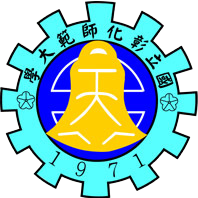SDG3.3.1 Current collaborations with health institutions-2020
NCUE actively cooperates with local, national, and global health institutions to protect the health and well-being of students and community residents of all ages and promote medical welfare, eliminate infectious diseases (including sexually transmitted diseases and AIDS), strengthen prevention and control efforts, and reduce drug abuse.
1. NCUE cooperates at the global level:
1.1 NCUE actively encourages faculty members to engage in research and publish on topics related to health promotion:
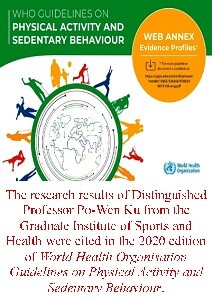 The research results of Distinguished Professor Po-Wen Ku from the Graduate Institute of Sports and Health have been cited in the World Health Organisation Guidelines on Physical Activity and Sedentary Behaviour 2020, evidence-based assessments and recommendations. The Guidelines have long been respected worldwide as an invaluable resource for researchers, policymakers, and practitioners in health-related fields such as clinical medicine, preventive medicine, public health, and sports medicine. Professor Ku’s research results, which appeared in the latest edition (2020), are an example of NCUE’s continuing contributions and international influence on global health and promoting medical welfare.
The research results of Distinguished Professor Po-Wen Ku from the Graduate Institute of Sports and Health have been cited in the World Health Organisation Guidelines on Physical Activity and Sedentary Behaviour 2020, evidence-based assessments and recommendations. The Guidelines have long been respected worldwide as an invaluable resource for researchers, policymakers, and practitioners in health-related fields such as clinical medicine, preventive medicine, public health, and sports medicine. Professor Ku’s research results, which appeared in the latest edition (2020), are an example of NCUE’s continuing contributions and international influence on global health and promoting medical welfare.
Annexes:
Annex 3.3.1A Professor Po-Wen Ku’s Research Results
For more information, visit this website:
https://www.ncue.edu.tw/p/406-1000-3745,r93.php?Lang=zh-tw
1.2 NCUE offers a transnational internationally accredited course for students seeking certification as international behaviour analysts.
NCUE’s Graduate Institute of Rehabilitation Counselling offers a transnational internationally accredited course in international behaviour analysis that meets international certification requirements. The course enhances students’ understanding of individual behaviours and strategies for addressing behaviour problems and providing high-quality teaching and counselling services as international behaviour analysts.
Annexes:
Annex 3.3.1B International Behaviour Analyst Certification courses offered by NCUE’s Graduate Institute of Rehabilitation Counselling
For the course accreditation, approval letter, and Admission Guidelines, visit this website:
https://www.abainternational.org/vcs/directory.aspx
2. NCUE cooperates at the national level:
2.1 NCUE actively cooperates with national-level departments to provide mental health and counselling services.
NCUE’s Community Psychological Counselling and Guidance Centre recently applied to join the Ministry of Health and Welfare’s Mental Health Support Programme for Medical Personnel during the COVID‑19 Pandemic. The programme provides free psychological counselling and care to medical personnel suffering from emotional problems such as nervousness, depression, anxiety, pain, or insomnia from the impact of the pandemic. The programme seeks to alleviate health providers’ mental health issues, allowing them to be at ease while working through the pandemic.
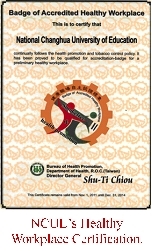 2.2 NCUE’s efforts in promoting a healthy workplace have led to its national certification.
2.2 NCUE’s efforts in promoting a healthy workplace have led to its national certification.
2.2.1 NCUE has been certified as a healthy workplace by the Executive Yuan, obtaining the highest level of health promotion certification.
2.2.2 Cooperating with government agencies, NCUE has established health promotion policies and measures for all faculty, staff, and students. The Ministry of Education also provides subsidies on health promotion for colleges and universities to implement health promotion activities.
2.3 NCUE’s efforts in sports, health and well-being has been recognised and awarded by the Ministry of Education
In 2020, NCUE was again awarded the Outstanding School Award of Sports Achievements: Colleges and University Group; NCUE was also accredited by the Sports Administration of the Ministry of Education.
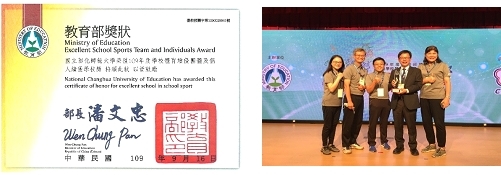
NCUE’s Outstanding School Award of Sports Achievements: Colleges and University Group
2.4 NCUE offers liberal education courses to improve students’ all-round health and well-being knowledge.
NCUE offers liberal education courses to increase students’ all-around health and well-being knowledge, enhance their understanding of social health and wellness, and promote their ability to develop health-promoting programs, policies, and practices.
Annex:
Annex 3.3.1C presents details on the courses offered by NCUE’s Centre for General Education
2.5 NCUE helped improve the availability of surgical masks in Taiwan during the COVID-19 epidemic.
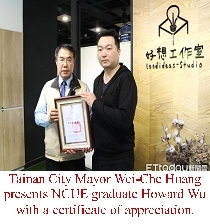 Surgical face masks protect both wearers and those around them from the spread of airborne infections. In the earliest days of the COVID‑19 pandemic, Taiwan’s citizens formed long queues outside convenience stores and pharmacies as the supply of surgical masks ran low. Howard Wu, a graduate of NCUE’s Department of Computer Science and Information Engineering, immediately responded by developing two programmes: the Convenience Store Mask Map programme and the Pharmacy Mask Map programme. Using Wu’s programmes, people could check nearby shops’ mask inventories, which helped them locate and purchase this personal protective gear. The programmes effectively expedited citizens’ access to masks, helping them prevent and control the spread of the virus in Taiwan. Tainan City Mayor Wei-Che Huang praised Wu’s efforts and presented him with a certificate of appreciation.
Surgical face masks protect both wearers and those around them from the spread of airborne infections. In the earliest days of the COVID‑19 pandemic, Taiwan’s citizens formed long queues outside convenience stores and pharmacies as the supply of surgical masks ran low. Howard Wu, a graduate of NCUE’s Department of Computer Science and Information Engineering, immediately responded by developing two programmes: the Convenience Store Mask Map programme and the Pharmacy Mask Map programme. Using Wu’s programmes, people could check nearby shops’ mask inventories, which helped them locate and purchase this personal protective gear. The programmes effectively expedited citizens’ access to masks, helping them prevent and control the spread of the virus in Taiwan. Tainan City Mayor Wei-Che Huang praised Wu’s efforts and presented him with a certificate of appreciation.
2.6 NCUE cooperates with the Ministry of Education to actively prevent and provide treatment for students’ drug abuse.
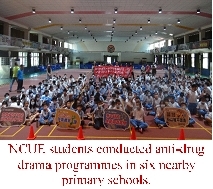 2.6.1 NCUE has been deeply engaged in preventing and controlling student drug abuse. NCUE received a National Outstanding University and College Award in the Prevention of Drug Abuse in Students in 2017, 2018, and 2019, making it the only national university to have received the award for three consecutive years.
2.6.1 NCUE has been deeply engaged in preventing and controlling student drug abuse. NCUE received a National Outstanding University and College Award in the Prevention of Drug Abuse in Students in 2017, 2018, and 2019, making it the only national university to have received the award for three consecutive years.
2.6.2 In 2020, NCUE gained the Ministry of Education’s approval to implement the Learning Model Programme for the Prevention of Drug Abuse in Students by Universities and Colleges, conducting anti-drug activities in nearby primary schools. NCUE raised funds to send 64 university students volunteers to participate in anti-drug drama performances for 676 primary school students in six primary schools.
Annex:
NCUE was awarded the Ministry of Education’s National Outstanding University and College Award in the Prevention of Drug Abuse in Students for three consecutive years. For more information, visit this website:
https://www.ncue.edu.tw/p/406-1000-3131,r93.php?Lang=zh-tw
3. NCUE cooperates at the local level:
NCUE cooperates and forms alliances with the local community. Through cross-departmental cooperation and interaction with the community, NCUE creates a supportive environment that benefits residents’ health, strengthens and expands community resources, and promotes health and wellness, contributing to society and helping community residents unlock their potential by improving their physical and mental health.
3.1 NCUE works with community members in university projects and increases the incentives to improve residents’ health.
3.1.1 In the project of University Social Responsibility Hub (USR Hub): Training Muscle Power for a Happy Life in Northern Changhua, NCUE coordinates with the Sports Administration of the Ministry of Education to offer free technological fitness tests that help community members assess their physiology and physical fitness. The tests also help participants choose suitable sports and exercises to improve and maintain their health. The project targets NCUE faculty, staff, and students aged 23–64 and community residents aged 23–64. To date, there have been ten test sessions serving 400 people total, and the project has been well received.
3.1.2 In the first half of 2020, eight full-time psychologists and 14 part-time psychologists at NCUE provided students with free individual and group counselling services. NCUE also invited psychiatrists from a partner hospital and local clinics to advise on physical and mental health and provide referrals and suitable medical resources. A total of 14 people availed themselves of the counselling resources. Overall, in 2020, NCUE held six group counselling activities for a total of 40 participants (267 person-times); provided 353 people with individual counselling (including individual counselling and psychological testing and interpretation) for a total person-times served of 2,643.
3.2 NCUE implemented measures to improve the health and well-being of the community and NCUE faculty, staff, and students
3.2.1 Various administrative units of NCUE joined a comprehensive physical and mental health care system to provide teachers and students with all-around health care. The units included the Health Service Section of the Office of Student Affairs, the Student Psychological Counselling and Guidance Centre, the Community Psychological Counselling and Guidance Centre, the Department of Athletics, and the Centre of Environmental Protection, Safety, and Health.
3.2.2 NCUE employed medical personnel (three full-time nurses, eight full-time psychologists, and 14 part-time psychologists) to provide teachers, staff, and students with health services. The services included free health consultations, medical care, individual and group counselling, and health management. In addition, Changhua Christian Hospital, a partner hospital with NCUE, sent general practitioners, occupational physicians, psychiatrists, and Chinese medicine practitioners to the NCUE campuses to serve at the clinics, providing physical and mental health consultations, on-site health guidance, and physiotherapy. NCUE also has 27 clinics as partners that provide referral services and advise teachers and students about available discounts and treatment options.
3.3.3 Between the early days of the COVID‑19 pandemic until 13 September 2021, the Student Psychological Counselling and Guidance Centre provided counselling using safe-contact communication tools, serving 80 people (160 person-times) over the phone.
The following table details the physical and mental health care services provided by NCUE to teachers and students in 2020:
|
Physical and mental health care services |
People served |
|
Consultations by visiting physicians and on-site consultations by occupational physicians |
435 person-times |
|
Treatment for injuries and illnesses in campuses (including trauma and health consultations) |
3,027 person-times |
|
Emergency incidents and medical delivery services |
26 people |
|
Medical equipment and anti-epidemic items for loan; use of nursing rooms |
313 person-times |
|
Use of health equipment |
3,301 person-times |
|
Individual counselling services in colleges |
4,674 person-times |
Annex:
Annex 3.3.1D: details on the individual counselling services provided to the colleges
4. Measures in place against the Covid-19 pandemic in 2020
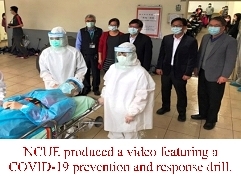 To effectively improve the health, safety, and well-being of its teachers, staff, and students under the ever-changing challenges of the COVID‑19 pandemic, NCUE instituted humane, safe, and effective disease-prevention measures to prevent the virus’s spread.
To effectively improve the health, safety, and well-being of its teachers, staff, and students under the ever-changing challenges of the COVID‑19 pandemic, NCUE instituted humane, safe, and effective disease-prevention measures to prevent the virus’s spread.
4.1 NCUE’s Office of Student Affairs produced a video, Protecting the Health of Teachers and Students, featuring a COVID‑19 prevention and response drill.
4.2 NCUE formulated the Regulations for Self-management of Cafeteria Staff, set up thermographic cameras at all cafeteria entrances, implemented name registration, mandated masks, and installed partitions to protect people in its campus cafeterias.
Annexes:
Annex 3.3.1E: details on NCUE’s disease prevention measures in 2020
Epidemic outbreak and prevention—For more about NCUE’s video, Protecting the Health of Teachers and Students, featuring a COVID‑19 epidemic drill on disease prevention from the Office of Student Affairs, visit this website:
https://www.ncue.edu.tw/p/406-1000-3747,r93.php?Lang=zh-tw
5. NCUE cooperates with medical institutions in academic research to improve the health and well-being of its teachers, staff, and students.
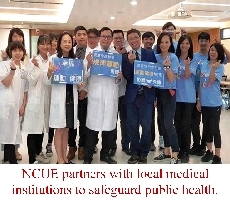 NCUE works with local medical institutions such as the Show Chwan Memorial Hospital, the Changhua Christian Hospital, the Public Health Bureau, and relevant medical centres and community hospitals to safeguard the health and well-being of teachers, staff, students, stakeholders, and community residents. They combine their professional power and medical capabilities to provide physical examinations; prevention education on sexually transmitted diseases (including AIDS); and vaccinations against influenza, COVID‑19, and other infectious diseases.
NCUE works with local medical institutions such as the Show Chwan Memorial Hospital, the Changhua Christian Hospital, the Public Health Bureau, and relevant medical centres and community hospitals to safeguard the health and well-being of teachers, staff, students, stakeholders, and community residents. They combine their professional power and medical capabilities to provide physical examinations; prevention education on sexually transmitted diseases (including AIDS); and vaccinations against influenza, COVID‑19, and other infectious diseases.
Annex:
Please refer to Annex 3.3.1F for the details of the academic research cooperation between NCUE and the medical institutions, which aims to protect the health and well-being of teachers, students and the local communities.
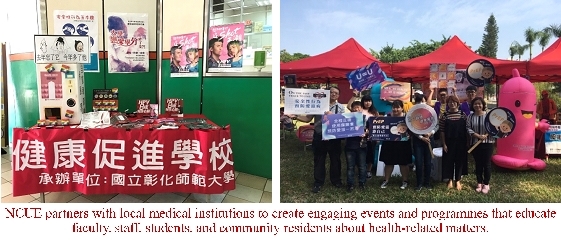
6. NCUE assists the Ministry of Education by being a role model for schools’ physical and mental health promotion.
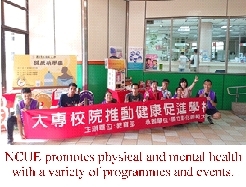 To effectively improve the health of its teachers, staff, and students, NCUE works with the Ministry of Education to develop various education programs on preventing and dealing with sexual assault; drug abuse prevention and recovery; holistic health; nutrition, healthy living, and weight control; and other health-related topics.
To effectively improve the health of its teachers, staff, and students, NCUE works with the Ministry of Education to develop various education programs on preventing and dealing with sexual assault; drug abuse prevention and recovery; holistic health; nutrition, healthy living, and weight control; and other health-related topics.
6.1 NCUE has received subsidies from the Ministry of Education to implement the Health-Promoting School Project for Universities and Colleges, the Service and Learning Model Programme for the Prevention of Drug Abuse in Students by Universities and Colleges, and the Project of Moral Education Promotion and Deep Cultivation in Schools to comprehensively promote the physical and mental health of teachers and students.
6.2 Implementation of the Ministry of Education’s subsidised college health promotion school plan: Adhering to the spirit of ‘health-promoting schools’, NCUE has conducted health empowerment courses and activities over the years to create a healthy campus environment and will continue to do so in the future. The project has four main themes: ‘Tobacco Hazard Prevention’, ‘Sexually Transmitted Diseases and AIDS Prevention Education’, ‘Weight Control’, and ‘Healthy Living’. In 2020, 5,359 people participated in the project activities.
|
2020 milestones |
Theme |
Subsidy amount (NTD) |
Participants (person-times) |
|
Received subsidies from the Ministry of Education to implement the Health Promoting School Project for Universities and Colleges |
‘Health is Wealth: Let’s Move to Become Healthy and Wonderland in NCUE |
212,500 |
5,359 |
|
Conducted the Service and Learning Model Programme for the Prevention of Drug Abuse in Students by Universities and Colleges |
Drama Performance at Secondary and Primary Schools to Prevent Drug Abuse |
141,907*
|
676 |
|
Advanced the moral education policy |
Moral Education Activities |
Self-raised within NCUE |
3,355 |
|
* Because of restrictions necessitated by the COVID‑19 pandemic, NCUE returned 108,725 NTD of the original subsidy. |
|||
Annexes:
Annex 3.3.1G Role Model of Health Promotion Schools describes NCUE’s relevant measures.
For more about ‘National Changhua University of Education: A health-promoting school’, visit this website:
http://health.ncue.edu.tw/files/11-1018-1264.php?Lang=zh-tw
Annex 3.3.1H: details of the Achievements in the Health Promotion School Project 2020.
Annex 3.3.1I contains links to other supporting information.
